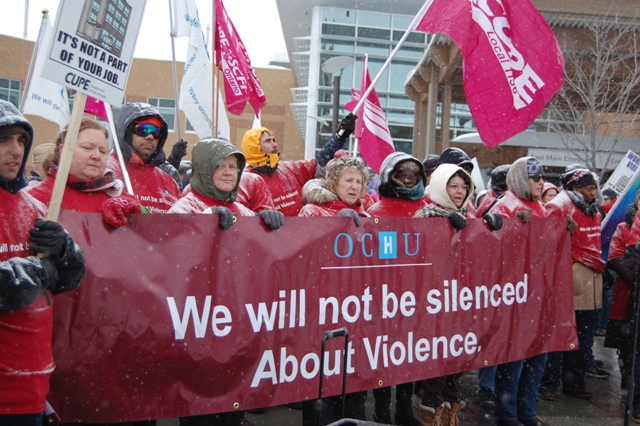TORONTO, ON – In the last week at North Bay Regional Health Centre, there have been two separate violent assaults against staff resulting in critical injury. North Bay hospital employees are vulnerable to violent assault a recent poll by the Ontario Council of Hospital Unions (OCHU) of the Canadian Union of Public Employees (CUPE), found. 59 per cent of all staff there reported having been assaulted in the last year. The number is much higher for employees working in nursing.
Last week’s assaults are the latest acts of violence this year at the North Bay Regional Health Centre. “But this is a problem in every hospital. We have seen a nurse stabbed in the face with a screwdriver, a personal support worker left unable to walk after being thrown against a wall, and a nurse beaten unconscious with a lead pipe. Nurses disfigured. Staff traumatized by seeing coworkers beaten into a coma. Staff routinely work alone and are vulnerable,” says Sharon Richer, OCHU’s new secretary-treasurer.
Over the last few years, the North Bay hospital has cut over 350 staff positions, many of them nurses and personal support workers who provide direct patient care and other frontline patient support staff.
Health care workplace violence “is an under-reported, persistent problem encouraged by the staffing cuts of the Ontario government. This cannot be allowed to continue,” says Michael Hurley, president of OCHU/CUPE.
According to the Canadian Institute for Health Information, one-half of all nurses were assaulted in 2014. According to the Ontario Hospital Association, there were 20 violent incidents a day at Ontario hospitals in 2015. A study, published last week in the New England Journal of Medicine, found that violence against hospital and long-term care staff is an under-reported, rampant and persistent problem. It’s also a problem that’s been tolerated and largely ignored, says the article.
“This is the pervasive brutalization of the women working in the health care sector, actively encouraged by the Ontario government, which understaffs our facilities, leaves us vulnerable to assault, and tolerates a repressive environment in which a nurse who raises the issue of violence can be fired by her hospital. Our health care facilities urgently need an increase in staffing, but the cuts to hospital staff coming from the recent provincial budget will only make this situation worse,” says Hurley.
Studies also show that violence and assault rates are linked to patient-contact time. “Nurses and personal support workers are victimized at the highest rates and it’s because we have the fewest staff directly working with patients of any province in Canada,” Hurley says.
OCHU is calling on the Ontario government to:
• Ensure that adequate staffing is in place, including properly trained security personnel who have the power to intervene. No health care worker should ever be alone with someone who has been identified as posing a risk;
• Make it a criminal offence to assault a health care worker;
• Ensure workers are encouraged to report acts of violence or situations in which violence could occur;
• Ensure that violence-prevention strategies are in place in every workplace, including personal monitors, alarms, and adequate and consistent identification of potentially violent patients;
For more information, please contact:
Michael Hurley
President, OCHU
416- 884-0770
Sharon Richer
Secretary-Treasurer, OCHU
705-280-0911
Stella Yeadon
CUPE Communications
416-559-9300

